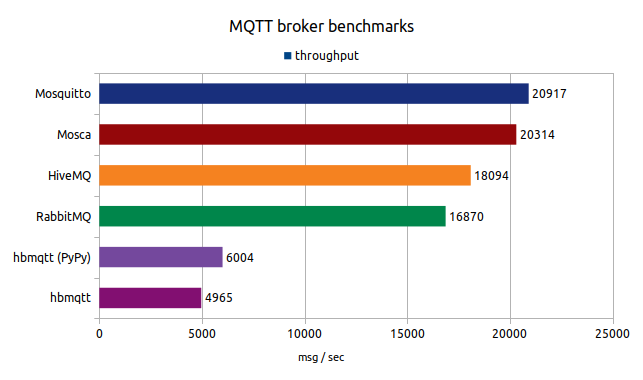In the context of my Master’s thesis I conducted a very basic performance comparison of several different MQTT brokers and quickly wanted to share my insights. Please note that these benchmarks are quite superficial only. I did not aim to perform an in-depth evaluation, but rather get a basic idea of their performance in general.
Setup
- To perform load tests in a publish scenario, I used takanorig/mqtt-bench, an MQTT benchmarking tool written in Go.
- All tests were run with the options
-count 10000,-clients 25and-size 4096, which means to simulate 25 concurrent MQTT clients, each sending 10,000 messages of 4 KBytes size each. - Both load testing tool as well as the respective broker were run locally on a 6-core, 12-thread, 3.6 Ghz machine with Ubuntu 18.04.
- Unless otherwise stated, the brokers were started with default configuration.
Brokers
The following brokers were tested.
| Broker | Written In | Version | Runtime | Additional Info |
|---|---|---|---|---|
| hbmqtt | Python | 0.8 | CPython 3.6 | – |
| hbmqtt (PyPy) | Python | 0.8 | PyPy 3.6 v7.1.1 | – |
| HiveMQ CE | Java | 2019.1 | Oracle JDK 12 | – |
| Mosca | JavaScript | 2.8.1 | Node 4.8.0 | – |
| Mosquitto | C | 1.6.3 | – | – |
| RabbitMQ | Erlang | 3.7.4 | – | enabled_plugins=[rabbitmq_management, rabbitmq_management_agent, rabbitmq_management_visualiser, rabbitmq_shovel_management, rabbitmq_stomp, rabbitmq_mqtt,rabbitmq_web_stomp, rabbitmq_web_mqtt] |
Results
These are the results that I obtained. Higher is better.

Comments